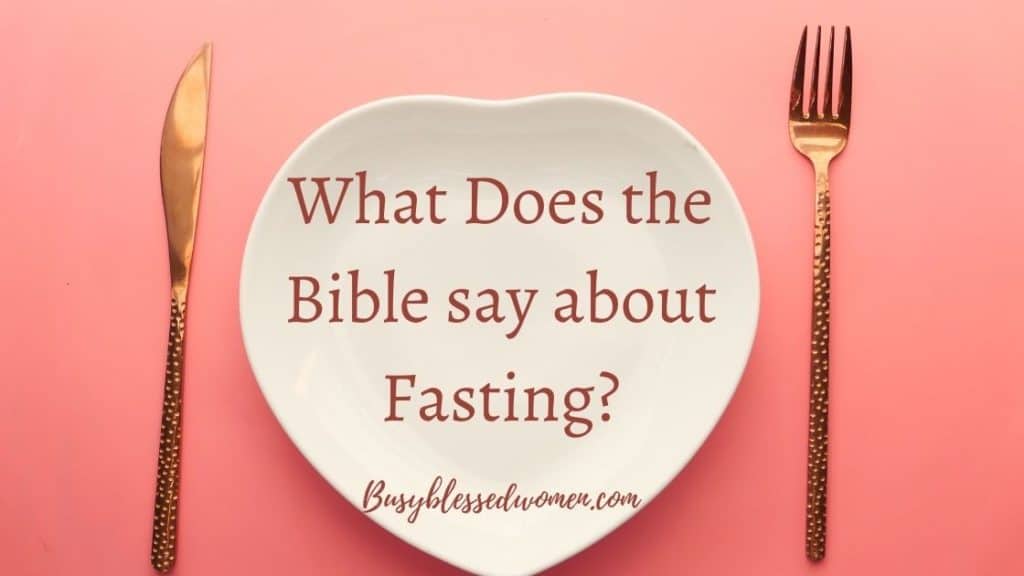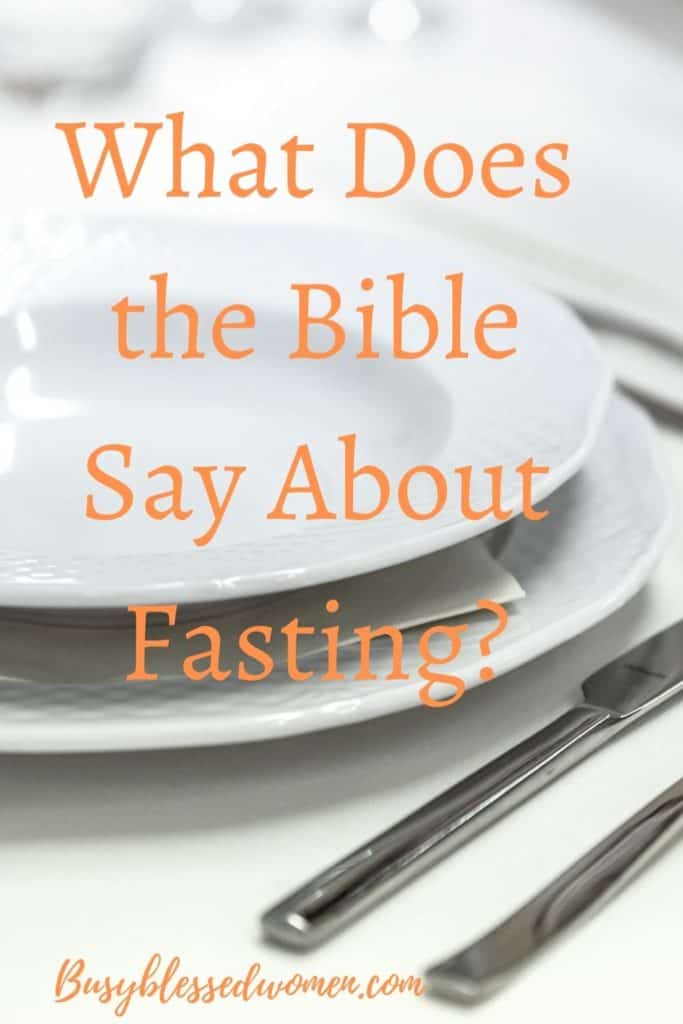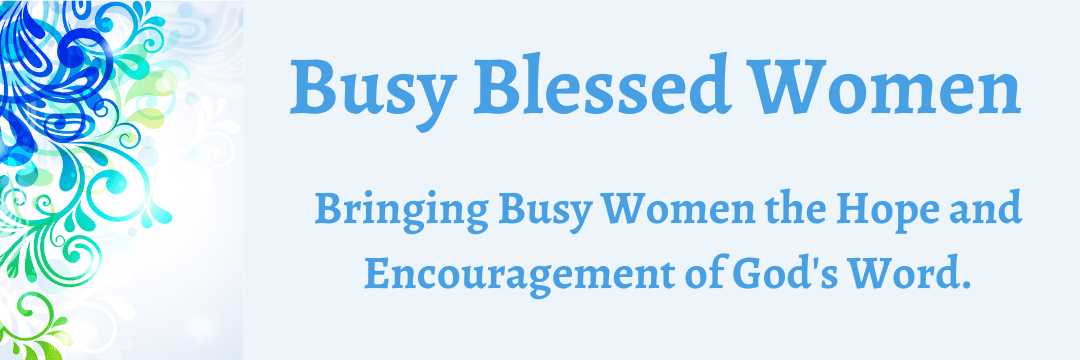
We learned last week that Queen Esther and her fellow Jews fasted and prayed for three days before her mission to go before the king. The topic of fasting sparked my curiosity because I have very little background in it. I didn’t think it was something I could ever take part in because of a medical/genetic issue that keeps me on the thin side. Yes, we had “meatless Fridays” during Lent while growing up. Is that a fast? I recently heard about the Daniel fast and wondered what that entailed. As always, let’s see what the Bible has to say!
Definition of Fasting in the Bible
The quick answer- fasting is an abstinence from food/drink for a set period. We see fasting in both the Old Testament and the New. Fasting is not a diet method, a way to get God’s attention, or a way to receive what we desire.
Jesus was clear that fasting is not to be used to appear more spiritual than others. Fasting is used to produce a change in us- heart and mind.
What is the Purpose of Fasting in the Bible?
Fasting was often observed as a sign of mourning for sin. Jonah proclaimed God’s judgement to the wicked people of Nineveh, and “the Ninevites believed God. They declared a fast, and all of them, from the greatest to the least, put on sackcloth.” Jonah 3:5 NIV.
It was also a common expression of deep sorrow when a loved one died.
Fasting was sometimes used to ward off a present or impending disaster. (Samuel had the people fast as the Philistines prepared to attack- 1 Samuel 7: 3-6)
Especially religious Jews fasted frequently. The prophetess Anna “worshiped night and day, fasting and praying.” (Luke 2:37). The Jewish religion did not require her to do this, but she felt the need to do so- possibly to be closer to hear God’s Word.
In the New Testament, they fasted and prayed at the ordination of some elders and missionaries. Regarding Barnabas and Paul:
“So after they had fasted and prayed, they placed their hands on them and sent them off.” Acts 13:3 NIV.
They didn’t always fast before going out on missions, but because this was Paul’s first journey, they may have felt it necessary.
The focus in fasting is often on the lack of food/drink, but its purpose is in taking our focus off the worldly things that steal our attention away from God. Fasting can be a way of coming before God to give Him glory, renew our reliance on Him, and gain new perspectives of how we are living our lives. It helps us focus on our spiritual life and can expand our personal and vital relationship with God.
Examples of Fasting in the Bible
The first and only fast required by Mosaic law was on the Day of Atonement when the high priest offered sacrifices for the nation’s sins. “Hold a sacred assembly and deny yourselves, and present an offering made to the Lord by fire.” Leviticus 23:27 NIV.
To this day, the Jews observe Yom Kippur with a day of fasting, prayer and personal soul searching.
In Joel 2:12, we see God calling for His people to repent, instructing His people to fast: “Even now, declares the Lord, return to me with all your heart, with fasting and weeping and mourning.”
When John the Baptist’s disciples questioned Jesus about why His disciples did not fast, He replied:
“How can the guests of the bridegroom mourn while he is with them? The time will come when the bridegroom will be taken from them; then they will fast.” Matthew 9:15 NIV.
(John’s disciples had fasted because they were in spiritual preparation for the coming Messiah. This reason didn’t apply to Jesus’ disciples; nor were they in mourning- a common time to fast.)
David Fasting
King David fasted as an expression of grief and mourning. When his best friend, Jonathan, died along with Saul and many others:
“They mourned and wept and fasted till evening for Saul and his son Jonathan… because they had fallen by the sword.” 2 Samuel 1:12 NIV
David pleaded in vain with God to heal his sick infant son. “He fasted and went into his house and spent the nights lying on the ground.” 2 Samuel 12:16 NIV.
The Daniel Fast
Daniel was one of the captives sent to Babylon along with other “best and brightest” Israelites. The Babylonians intended to indoctrinate them into their pagan society and occult religion. They also assigned them to eat of the king’s food.
“But Daniel resolved not to defile himself with the royal food and wine” (1:8) and asked for only vegetables and water.
Later in his life, Daniel fasted for 3 weeks in response and to gain an understanding of a vision he had: “I ate no choice food; no meat or wine touched my lips…” (10:3)
Daniel, a faithful follower of God, faced his trials with prayer and fasting. He was courageous and brave to hold fast to his faith, even when persecution and certain death seemed imminent.
I first heard about “the Daniel fast” in a prayer group that I attend. For those unable to go without food or water because of medical conditions, it can be a way to take part in the spiritual discipline of fasting.
(It has also morphed into “the Daniel diet” with books and websites explaining the dietary changes that have nothing to do with focusing on God, but a healthy lifestyle of eating and/or weight loss.)
Jesus Fasted
Just prior to beginning His ministry, the Holy Spirit led Jesus into the wilderness for forty days. “And he ate nothing during those days. And when they were ended, he was hungry.” Luke 4:2b NIV.
Jesus’ physical hunger shows us His human side. After fasting for 40 days and nights, Satan comes to tempt Him. Even in His physically weakened state, His spiritual strength and God’s Word allowed Him to defeat Satan’s temptations. His fast, while not workable for us, still shows that fasting can help us draw closer to God; leaning on Him fully to sustain us.

Pin me for later!
Jesus’ Teaching on Fasting
Jesus took issue with those who tried to appear humble and sorrowful to inflate their reputation as godly men and gain approval from others. He denounced the legalistic and ritualistic practice of fasting.
“When you fast, do not look somber as the hypocrites do, for they disfigure their faces to show men they are fasting. I tell you the truth, they have received their reward in full. But when you fast, put oil on your head and wash your face, so that it will not be obvious to men that you are fasting, but only to your Father, who is unseen; and your Father, who sees what is done in secret, will reward you.” Matthew 6:16-18 NIV.
The words “when you fast” were not a requirement to fast, but the confirmation that as Jews, there were days of fasting that were expected to be carried out. It had become common for some Jews to fast twice a week. (Luke 18:11-12)
Jesus instructs us in the proper way to fast. He stresses the personal and tender relationship we have with God– “but only to your Father… and your Father, who sees what is done in secret…”
No one should be able to tell we are fasting- it is a private act of reverence and devotion between you and God.
Reason for Fasting
Esther fasted to receive direction from God before her mission to save the Jewish people. Daniel fasted when he needed revelation regarding a vision. Jesus fasted as a time of preparation before He began His earthly ministry.
Each fast was time of connecting with God on a deeper level.
We all have times when the constant demands of our time/energy disrupt our sense of peace that comes from God.
We’ve all had important decisions to make that leave us aching for God’s direction and guidance.
There are times we feel the need to go deeper into our connection with God and be more in tune with His will.
Fasting adds an extra layer of setting apart not just our time, but a sacrifice of abstaining and denying ourselves to connect personally with God. Fasting is not self-punishment or a way to earn extra benefits from God. It is to align our lives with His purpose, deepen our dependence on Him, and a way to genuinely “seek His face” with a humble heart.
Fasting and Worship
In Isaiah 58, the Israelites went before God to complain that their fasting had not produced their desired results. God exposes their worship and fasting as empty and meaningless; the way they lived their lives proved it. Their hearts were not sincere in their obedience and love for Him.
His answer to them was to stop the superficial fasting and tells them how to fast in the way that pleases Him- by reaching out to help others, stop with the evil we do towards others, and start doing things for others in the spirit of love.
God saw their faith lacked sincerity. Fasting can be beneficial, but true fasting goes one step further. It takes His Word and applies it to our world.
We can use fasting as worship; acknowledging we need Him in our lives more than the food we eat. The physical hunger we feel during a fast can help us correlate with the spiritual hunger we have for Jesus’ presence in our lives. Connecting fasting with living in His ways can bring His blessings of guidance, strength, and true satisfaction.
Blessings!
AnnMarie
All Scripture is taken from the NIV unless specified otherwise.
Photo Credit: Deposit Photos

Greeting’s in Christ name
Thank you so much for this beautiful and powerful explaination about prayer and fasting. To God be the glory for using your life and be a blessings in your brethren here in Bahrain. Just started reading this email message and while reading I received from the Lord the vision of this message. And thank God for using your life I decree and declare blessings in every area of your life in Jesus Name Amen
Thank you for your beautiful prayer and encouragement! God has guided me, provided His wisdom, and led me on this journey of sharing His love and His Word. To Him be all the glory! It amazes me that He reaches around the world with His message. I must admit that I had to look up exactly where Bahrain was, and was excited to learn that approximately 14% of it’s population is Christian! Blessings to you and my fellow followers of Jesus.
Thank you again Ma’am AnnMarie for this wonderful and detailed lessons about fasting. Almost your post every week are very timely for me.
I usually fast(at least half-day) once a week. But this time, I’m on prayer and fasting for a week(for halfdays only as well), no coffee for a week even after break . I had this urgency in my spirit to fast for a longer period so I started last August 12 and it will end tomorrow. I just wanted to dwell deeper in His presence, hear more from His Word, seek His will and guidance in our family and church ministry as we take a new steps of faith and journey for a higher or wider responsibility.
God bless.
Good morning Leny! Thanks so much for sharing your fasting experience! It is convicting me to use it at times when I need His guidance in a deeper way. You are in my daily prayers; may He bless your ministry as you seek to expand your reach!
Great lesson, as always. Thanks, Ann
Thanks Cindy! Have you ever fasted?